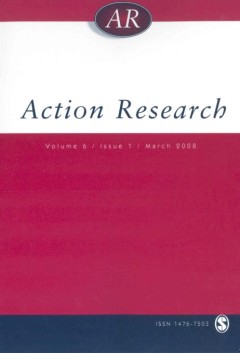Filter by
Opening and closing communicative space with teachers investigating race and …
This article explores the very practical challenges that the author experienced as she and a racially mixed elementary school teaching staff negotiated communicative space within a critical inquiry group exploring race and racism in their teaching context. Specifically, the author explores her role of critical friend as crucial to forming communicative space; the ways that communicative space w…
- Edition
- Vol. 7, No. 3, September 2009.pp. 335-354
- ISBN/ISSN
- 1476-7503
- Collation
- -
- Series Title
- Action Research
- Call Number
- -

Multi-site action research: Conceptualizing a variety of multi-organization p…
Classical action research within single organizations has become a well established and differentiated approach since its inception more than six decades ago. More recently, many have built on the foundational principles of action research to develop and implement larger-scale, multi-organization, action research approaches. Multi-organization action research has largely taken the form of coali…
- Edition
- Vol. 7, No. 4, Dec 2009. pp. 363-384
- ISBN/ISSN
- 14767503
- Collation
- -
- Series Title
- Action Research
- Call Number
- -

Are we talking the walk of community-based research?
When we present ourselves as doing research that is participatory and action oriented, are we meeting either of those goals? An analysis of 232 concept applications sent to the Sociological Initiatives Foundation community-based research funding pool shows that most proposed research emphasized neither participation nor action. Grassroots community members, or organizations controlled by them, …
- Edition
- Vol. 7, No. 4, December 2009. pp. 385-404
- ISBN/ISSN
- 14767503
- Collation
- -
- Series Title
- Action Research
- Call Number
- -

What kind of respect is this? Shifting the mindset of teachers regarding cult…
In this article I attempt to answer the question, �How can I influence teachers to be able to contribute to changing social/cultural norms and practices that hamper effective HIV & AIDS education and prevention?� There is a growing realization that HIV & AIDS education and prevention initiatives need to move away from trying to change the sexual behaviour of individuals towards addressing socie…
- Edition
- Vol. 7, No. 4, December 2009. pp. 405-422
- ISBN/ISSN
- 14767503
- Collation
- -
- Series Title
- Action Research
- Call Number
- -
Action research literature 2006—2008: Themes and trends
In this, the third in a series of two-yearly reviews (see also Dick, 2004, and Dick, 2006), I identify some of the action research literature that has appeared in books and edited collections over approximately the past two years. After an overview of the general action research literature I gather together other relevant literature under the following headings: action learning; community-based…
- Edition
- Vol. 7, No. 4, December 2009. pp. 423-441
- ISBN/ISSN
- 14767503
- Collation
- -
- Series Title
- Action Research
- Call Number
- -

Action research in teacher education: Two teacher-educators practice action r…
Two teacher-educators, an instructor and a teaching assistant, designed an action research project focused on enhancing their professional practice and the practice of their students by introducing the preservice teachers to action research. Both teacher-educators viewed this decision as progressive and emancipatory, as action research encourages inquiry and reflection, connects theory to…
- Edition
- Vol. 6, No. 1, March 2008. Page 7-28
- ISBN/ISSN
- 1476-7503
- Collation
- -
- Series Title
- Action Research
- Call Number
- -

Participatory teacher development at schools: Processes and issues
This article describes an action research study on reflective development at school and discusses methodological and pedagogical issues arising from teacher beliefs and expectations. Teachers and researchers participated in four cooperative cycles of inquiry, where situated learning and reflection supported their conceptual change and meaning-making. Teachers underwent a gradual shift fro…
- Edition
- Vol. 6, No. 1, March 2008. Page 29-48
- ISBN/ISSN
- 1476-7503
- Collation
- -
- Series Title
- Action Research
- Call Number
- -

The role of citizen participation and action research principles in Main Stre…
This article examines the use of citizen participation techniques during the planning process for neighborhood revitalization in the Village of Depew which is an industrial suburb of Buffalo, New York. The article focuses on how action research principles can inform and enhance traditional approaches to citizen participation. In particular, we discuss our role as university-based consulta…
- Edition
- Vol. 6, No. 1, Page 69-93
- ISBN/ISSN
- 1476-7503
- Collation
- -
- Series Title
- Action Research
- Call Number
- -

Emancipation or workability?: Critical versus pragmatic scientific orientatio…
In this article a distinction between a pragmatic and a critical orientation of action research is made. These orientations can be considered, implicitly or explicitly, to be the main alternatives in AR today. What are the assumptions behind, and practical implications for, AR projects with different orientations? A number of themes are introduced where a tension between the two are ident…
- Edition
- Vol. 6, No. 1, Page 95-115
- ISBN/ISSN
- 1476-7503
- Collation
- -
- Series Title
- Action Research
- Call Number
- -

Challenging institutional barriers to community-based research
Those of us attempting to develop truly equal partnerships with communities and community organizations, using the method of community-based research, encounter many barriers. These barriers revolve around who sets the schedule, who determines the labor pool, who controls the product, and who gets the funding. In this article, a case study shows how those barriers exert themselves, and ev…
- Edition
- Vol. 6, No. 1, March 2008. Page 49-67
- ISBN/ISSN
- 1476-7503
- Collation
- -
- Series Title
- Action Research
- Call Number
- -

Generating the power for development through sustained dialogue: An experienc…
This article describes a project to promote development in a rural area of the KwaZulu Natal Province of South Africa. Using a methodology called sustained dialogue, this project engaged a cross-section of leaders from several villages to reflect on past development efforts, design and implement new projects, and then evaluate their success. This project shows that a key contribution that…
- Edition
- Vol. 6, No. 2, Page 213-232
- ISBN/ISSN
- 1476-7503
- Collation
- -
- Series Title
- Action Research
- Call Number
- -

Over the rainbow: The politics of researching citizenship and marginality
This article deals with different methodological enquiries in researching citizenship and marginality in a developing context. It is based on reflections emerging from a five-year collaborative international research programme that focused on enhancing the efforts of the poor and marginalized groups to define and claim their rights and make citizenship matter. The article deals with the p…
- Edition
- Vol. 6, No. 2, Page 233-253
- ISBN/ISSN
- 1476-7503
- Collation
- -
- Series Title
- Action Research
- Call Number
- -

Speaking for ourselves: A Colombia-Canada research collaboration
As an Assistant Professor in Community Economic and Social Development (CESD) at Algoma University College, Ontario, Canada and a member of Asopricor Holistic Association, Cundinamarca, Colombia, respectively, the authors have engaged in an ongoing dialogue regarding the inherent contradictions of forming a North—South, university—community research collaboration. For those who have e…
- Edition
- Vol. 6, No. 2, June 2008. Page 129-147
- ISBN/ISSN
- 1476-7503
- Collation
- -
- Series Title
- Action Research
- Call Number
- -

Action research and social development in China: Creating synergy between mar…
This article argues that the usefulness of action research hinges on a heightened sensitivity towards its relevance and irrelevance to social, economic and cultural environments in which the professional action researchers conduct their research. Its contribution to transforming social situations depends on how well the researchers can bring the different stakeholders of the local communi…
- Edition
- Vol. 6, No. 2, Page 193-212
- ISBN/ISSN
- 1476-7503
- Collation
- -
- Series Title
- Action Research
- Call Number
- -

Research for change: Outcome mapping's contribution to emancipatory action re…
Although emancipatory action research has been practised for decades and continues to evolve, the method can benefit from the support of fresh approaches. Outcome mapping is an innovative planning, monitoring, and evaluation methodology recently conceived by Canada's International Development Research Centre in partnership with others. This article sets out the ways the two approaches complemen…
- Edition
- Vol. 6, No. 2, June 2008. Page 171-192
- ISBN/ISSN
- 1476-7503
- Collation
- -
- Series Title
- Action Research
- Call Number
- -

Active research towards the addressal of HIV/AIDS in the informal economy in …
In this article we offer an account of research undertaken for the International Labour Organization (on behalf of the National Aids Council in Zambia) in relation to HIV/AIDS and the informal economy in Zambia. We concentrate on how we tried to operate in terms of a conscious recognition of (and acceptance of responsibility for) our complicity as inquirers (together with others) in the d…
- Edition
- Vol. 6, No. 2, Page 149-170
- ISBN/ISSN
- 1476-7503
- Collation
- -
- Series Title
- Action Research
- Call Number
- -

Reciprocity: An ethic for community-based participatory action research
Ethical issues have been of ongoing interest in discussions of community-based participatory action research (CBPAR). In this article we suggest that the notion of reciprocity � defined as an ongoing process of exchange with the aim of establishing and maintaining equality between parties � can provide a guide to the ethical practice of CBPAR. Through sharing our experiences with a CBPAR projec…
- Edition
- Vol. 6, No. 3, Page 305-325
- ISBN/ISSN
- 1476-7503
- Collation
- -
- Series Title
- Action Research
- Call Number
- -

Teaching and learning action research: Transforming students, faculty and uni…
This article describes our experience teaching action research (AR) in a Mexican graduate program. It emphasizes the challenges associated with teaching this kind of research in Mexico and illustrates ways we address those challenges. It also illustrates that a high level of personal growth often accompanies AR training and that such growth, as well as learning the `mechanics' of AR, is signifi…
- Edition
- Vol. 6, No. 3, September 2008. Page 327-349
- ISBN/ISSN
- 1476-7503
- Collation
- -
- Series Title
- Action Research
- Call Number
- -

e-PAR: Using technology and participatory action research to engage youth in …
There is increasing interest in `moving upstream' in youth health promotion efforts to focus on building youth self-esteem, self-efficacy and civic engagement. Participatory Action Research (PAR) can be a powerful mechanism for galvanizing youth to become active agents of this change. Engaging youth in PAR and health promotion, however, is not always an easy task. This article describes a model…
- Edition
- Vol. 6, No. 3, Page 285-303
- ISBN/ISSN
- 1476-7503
- Collation
- -
- Series Title
- Action Research
- Call Number
- -

Authenticity as first person practice: An exploration based on Bernard Lonergan
In this article I explore how the notion of authenticity may be grounded in first person practice, rather than in the quality of research data. Drawing on the work of the philosopher-theologian Bernard Lonergan who follows a first person approach and who articulates a notion of authenticity, I explore how authenticity may be framed in terms of being attentive, intelligent, reasonable, and respo…
- Edition
- Vol. 6, No. 3, Page 351-366
- ISBN/ISSN
- 1476-7503
- Collation
- -
- Series Title
- Action Research
- Call Number
- -
 Computer Science, Information & General Works
Computer Science, Information & General Works  Philosophy & Psychology
Philosophy & Psychology  Religion
Religion  Social Sciences
Social Sciences  Language
Language  Pure Science
Pure Science  Applied Sciences
Applied Sciences  Art & Recreation
Art & Recreation  Literature
Literature  History & Geography
History & Geography